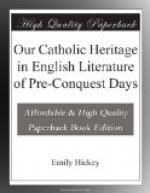AEthelflaed fortified Chester and other towns, and, along with King Edward, built fortresses, “chiefly along the line of frontier exposed to the Danes, as at Bridgenorth, Tamworth, Warwick, Hertford, Witham in Essex, and other places.” Of course it is uncertain whether our poet was thinking of AEthelflaed. We should be able to say whether it were impossible if we knew the date of “Judith,” as, if the poem were composed before AEthelflaed’s time, she could not have entered into the poet’s mind.
The Church has paid a splendid tribute to Judith by applying to her who is pre-eminently the strong or valiant woman (mulier fortis) full of the strength that always wore the exquisite veil of humility, the words spoken to this valiant woman of the Hebrews by her countrymen, as they adored the Lord, who had given her the victory. See the lesson read on the Feast of Our Lady’s Seven Sorrows.
CHAPTER X
Byrthnoth, the leader of the East Angles against Anlaf the Dane. Refusal to pay unjust tribute. Heroic fight.
We have in the “Battle of Maldon” a great patriotic poem, written about the “ealdorman"[H] of the East Angles, Byrthnoth, or Brihtnoth, who stood so valiantly against the Danes. It was he who was so good to the monks, helping to defend them against the “ealdorman” of the Mercians, and others who were turning them out: he also helped to found the Abbey of Ely. He was buried there, we are glad to know. Anlaf, known as Olaf Tryggvesson, afterwards King of Norway, came with two other Northmen, and harried Ipswich and other places, and then sailed up the Pant or Blackwater to Maldon, where the river divides into two parts. The beginning and end of the poem have been lost, and, as we have it now, it opens with the command of Byrhtnoth that every man should let his horse go, and march afoot to meet the enemy and strive with him hand to hand.
[Footnote H: “Alderman” is the modern form, but it does not mean the same thing.]
Then Byrthnoth ’gan
array his men; he rode and gave the rede,
He shewed the fighters how
to stand and keep the place at need,
Fast with their hands to hold
the shields, nor be afraid indeed.
He took his place among his own bodymen, his immediate followers. On the other side of the stream the herald of the vikings (or pirates) stood, and with a loud voice gave the scornful message of the sea-folk to the English leader. If Byrhtnoth would be in safety he must quickly send treasure to the foe.
“And better ’tis
for you buy off this onset of the spear
With tribute than that we
should deal so sore a combat here;
We need not spill each other’s
lives if ye make fast aright
A peace with us; if thou agree,
thou, here the most of might,
Thy folk to ransom, and to
give the seamen what shall be
Right in our eyes, and take
our peace, make peace with told money.
We’ll haste to ship,
we’ll keep that peace, and go upon the sea.”




